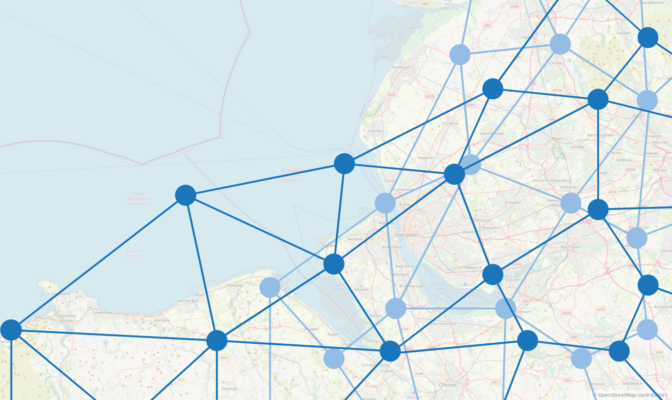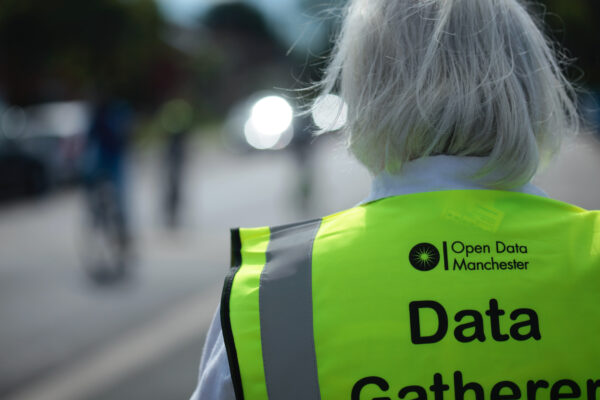We know data has the power to transform everybody’s lives and so we have a portfolio of projects built to make sure this happens in the way we all want.
Our projects have been developed over many years, shaped by the people who get involved, to tackle some of data’s biggest challenges:
- a commitment to intelligent and responsible use among organisations, professionals and activists
- building understanding and skills in the communities we serve
- ensuring everyone can be involved in decisions being made using data about them
Current projects
Our core programme aims to enhance democratic participation through inclusive and accessible data practices in Greater Manchester. We aim to increase data literacy, provide resources for civic engagement, and empower communities to harness data for self-representation and informed decision-making.
Key Objectives:
- Increase individual awareness and confidence in using data for civic participation
- Enable communities to represent themselves through data and challenge policy
- Empower individuals and groups to uphold their rights regarding data use
Our Approach:
- Utilise participatory and user research techniques to understand how different groups experience the datafied world we live in.
- Educate on open data, data collection systems, and existing data rights.
- Co-design and create resources and tools for data collection, engagement and representation.
- Deliver workshops, training and project support to empower communities to use data effectively in policy discussion.
By empowering individuals and communities to engage with data, represent themselves, and challenge policies, we aim to create a more inclusive and equitable data landscape in Greater Manchester. This project builds on our previous Data for Communities workshops, which introduced data concepts through accessible sessions in community centres and libraries.
An ethical framework for data use in our increasingly data-driven world, The Declaration was co-designed over the 18 months to September 2020 with the generous support and expertise of practitioners from public, private, academic, civil-society and voluntary organisations. We are currently refreshing the declaration to address recent changes in the data landscape and future-proof against upcoming developments.
Key Objectives:
- Refresh the Declaration to reflect current data practice challenges
- Identify resources needed by organisations to implement the Declaration
- Foster continued engagement with responsible data practices among stakeholders
Our Approach:
- Conducting sector-specific workshops (public, private, VCSE, academia, general public)
- Synthesising workshop outputs to draft changes
- Refinement of changes based on community input
- Creating a “wish list” of support resources for organisations
Timeline:
- Workshops and initial drafting: August 2023 – November 2023
- Community feedback and refinement: November 2023 – January 2024
- Publication and promotion: Mid-late 2024
Expected Outcomes:
- An updated Declaration reflecting current and future challenges
- A comprehensive list of implementation resources and support
- Strengthened local community engagement in responsible data practices
Open 3P is an open standard specifically designed for the packaging value chain, developed and maintained by Open Data Manchester. This free-to-use standard aims to revolutionise the packaging industry by fostering collaboration, sustainability, and compliance through standardised packaging data.
Key Objectives:
- Provide a comprehensive data standard for all types of packaging
- Foster sustainable and efficient practices in the packaging value chain
- Ensure compliance with existing and upcoming regulations
- Facilitate collaboration across the packaging ecosystem
Development and Governance:
- Initially created as part of the Plastic Packaging Portal (PPP) Project
- Expanded to cover all packaging types with support from Innovate UK
- Developed through collaboration with over 200 individuals from 120 organisations
- Governed by a board of industry experts (Standard Custodian Board)
- Open Data Manchester serves as the Data Standard Holding Body
Key Features:
- Covers all types of packaging (Version 2.0 released in May 2023)
- Designed to reflect current industry realities and future aspirations
- Supports systemic change in the packaging value chain
- Ensures neutral and independent representation of all stakeholders
Impact: By providing a standardised approach to packaging data, Open 3P enables:
- Improved sustainability practices
- Enhanced compliance with regulations
- Increased efficiency across the packaging value chain
- Better collaboration among industry stakeholders
Find out more at open3p.org
A collaborative project that aims to revolutionise data sharing and governance for the circular economy. In partnership with Loughborough University and Dsposal, and supported by TechUK and Buyerdock, we’re developing open standards for core product data exchange, initially focusing on Batteries and Electrical and Electronic Equipment (EEE).
Key Objectives:
- Develop open standards for core product data exchange
- Create data infrastructure applicable across various sectors
- Support the transition to a more sustainable and circular economy
Our Approach:
Building on our experience with the Open 3P standard for packaging data, we’re bringing together stakeholders from across the EEE and batteries ecosystems to develop a streamlined, standardised approach to collecting and sharing product data. This approach aims to:
- Improve data accuracy
- Reduce administrative burden
- Facilitate compliance with global reporting requirements
- Support the implementation of digital product passports (DPP)
Expected Impact:
The Open Product Initiative offers benefits for various stakeholders:
- Manufacturers, brands, and retailers: Improved supply chain visibility and risk management
- Government and regulators: Better-informed policy design and implementation
- Recyclers and third-party services: Enhanced efficiency and innovation opportunities
- The public: Increased product transparency and environmental sustainability
By improving data exchange across the value chain, we’re laying the foundation for a more circular, efficient, and sustainable future.
A collaborative project led by Noisy Cricket partnering with Honey Badger, GMCA, and the University of Manchester. The aim is to understand data sharing practises, communicate and engage with communities on their data sharing preferences and co-create a tool to enable visualisation of the risks and rewards for both.
Key Objectives:
- Design strategies to engage communities regarding their data sharing preferences
- Analyse current data sharing practices within Greater Manchester’s local government
- Co-create visualisation tools to illustrate the risks and rewards of data sharing
Our Role:
- Conducting stakeholder interviews and workshops to understand the data sharing practices
- Creation of a data flow map that depicts the data sharing ecosystem, which will inform the rest of the project.
Expected Outcomes:
- Enhanced trust between communities and local authorities
- More transparent and ethical data sharing practices
- Improved service design and delivery based on community needs and preferences.
Open Data Manchester runs the Design Justice node for the North of England, a group of practitioners dedicated to exploring and applying design justice principles in our region. We host monthly online meetings with occasional in-person gatherings, bringing together a diverse membership including designers, academics, government officials, and private sector professionals.
Key Objectives:
- Explore and apply Design Justice Network principles
- Facilitate knowledge sharing and collaborative learning
- Connect design justice practitioners across the northern region
Activities:
- “Show and Tell” sessions showcasing members’ work
- Resource sharing and collaborative learning
- Networking with other Design Justice nodes and related organisations
Topics Discussed:
- Community engagement and empowerment
- Ethical technology and AI
- Urban design and architecture
- Participatory design methods
- Social impact and sustainability
- Intersections of design with policy and governance.
Following on from the UK 2024 local and general elections, we are creating a comprehensive dataset linking local democratic representation with socioeconomic factors across England. We’ve been mapping political affiliations at the ward level and correlating this data with deprivation indices, to see what questions might arise and to help fills gaps in our understanding of local democracy.
Key Objectives:
- Collect and consolidate ward-level political representation data from 317 English local authorities
- Map this data onto 33,755 Lower Layer Super Output Areas (LSOAs)
- Create an open dataset for researchers, policymakers, and the public
- Visualise the correlation between political representation and deprivation
Further planned activities:
- Hosting a ‘digging the data’ event in late September to explore and visualise the data
- Continuing to refine and expand the dataset
This project will provide valuable insights into the relationship between local democratic representation and socioeconomic factors, potentially informing policy decisions and academic research. By making this data openly available, we’re enabling a wide range of stakeholders to better understand and address issues of representation and deprivation at a local level.
Open Data Manchester is engaged as a Digital Sustainability Consultant for Manchester’s Digital Strategy, focusing on three innovative projects: Smart Energy City initiative, Digital Action on Healthy Air program, and Radical Action on Waste scheme, which aim to bridge the gap between Manchester’s sustainability goals and digital innovation.
Key Objectives:
- Initiate and set up three sustainability-focused digital projects
- Engage diverse stakeholders in co-creation workshops
- Develop actionable project briefs for each initiative
Our Approach:
- Comprehensive stakeholder engagement
- Co-creation workshops with diverse participants
- Synthesis of ideas into actionable project briefs
Our Expertise:
- Community-led data projects
- Environmental monitoring
- Digital strategy development
Expected Outcomes:
- Develop detailed project briefs for each initiative
- Establish a network of engaged stakeholders
- Create a foundation for Manchester’s sustainable digital future
By aligning sustainability with digital technologies, we’re working to create more equitable, efficient, and environmentally friendly solutions for Manchester’s residents.
Interested in how Open Data Manchester might help you? Find out more about what we do or get in touch for a friendly chat.


